What Is Dog Boarding? Everything Pet Parents Need to Know
PetSuites Boarding
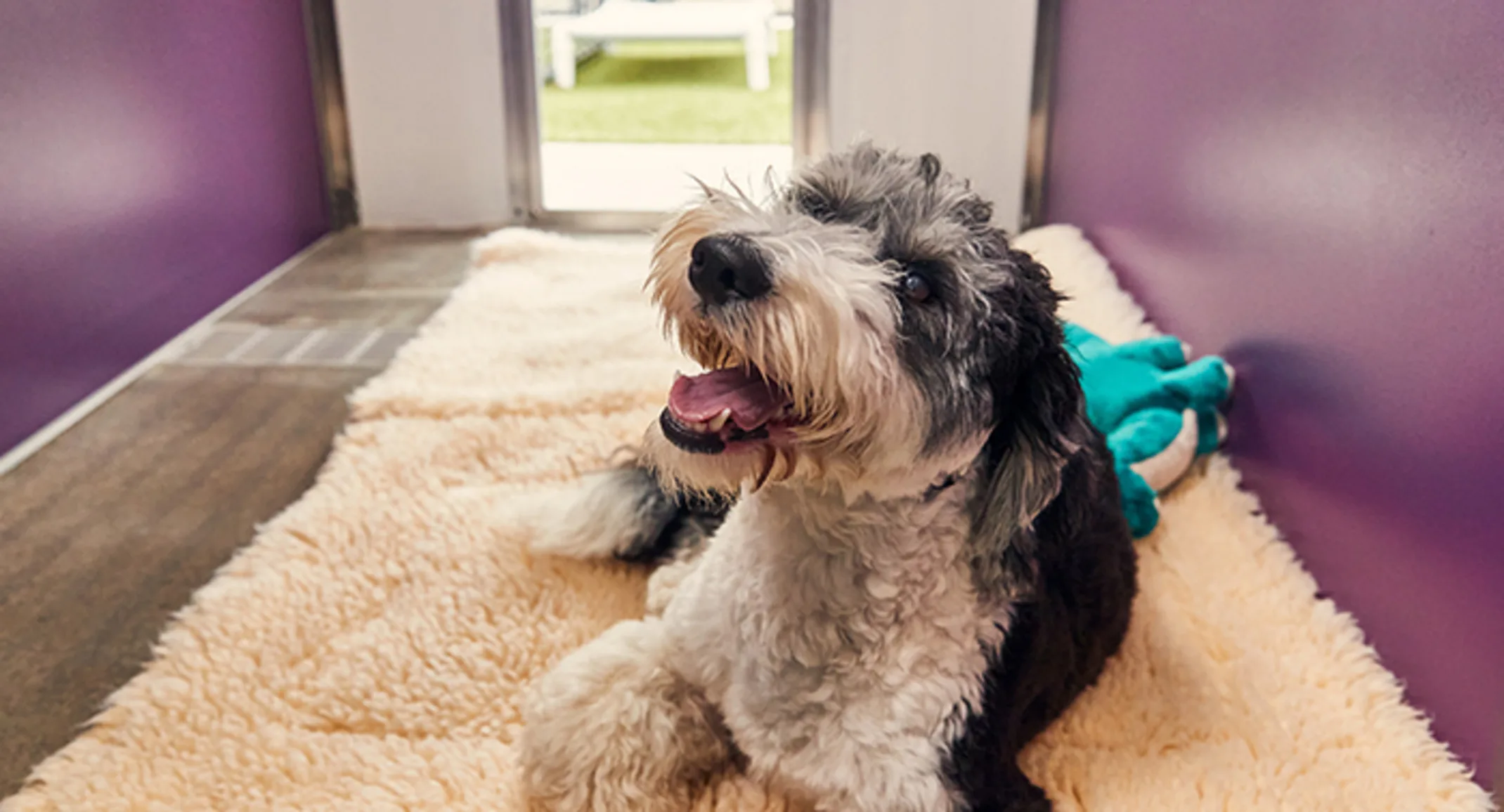
When life takes you out of town and your dog can’t tag along, dog boarding is a reliable and professional solution. Whether you're heading off for a vacation, a work trip, or just need overnight care, boarding facilities provide your dog with a safe, enriching, and supervised environment.
For many dogs, boarding isn’t just a stay, it’s a vacation of their own, filled with new friends, fun activities, and as much or as little play as they desire. But not all boarding options are created equally and understanding what to expect can help you choose the best experience for your pup. We’ve put together everything you need to know about dog boarding to help you make the right choice and ensure your dog has a great time while you’re away!
Quick Guide: Dog Boarding Basics
What is dog boarding? A service where dogs stay overnight or longer at a professional facility with staff, feeding schedules, exercise, and enrichment.
What types of boarding options exist? Options include traditional kennels, daycare-style boarding, luxury pet hotels, and veterinary boarding.
Why choose dog boarding at a professional facility? Trained caregivers, safety protocols, and structured routines make it a dependable choice.
Are there risks with dog boarding? Like any group environment, there's a slight chance of illness, injury, or stress, but good facilities minimize these risks.
What should I look for in a dog boarding facility? Look for licensing, vaccination policies, staff credentials, and transparent communication with staff.
What Is Dog Boarding?
Dog boarding is like a temporary hotel stay for your dog, but with the added benefit of pet-focused staff and routines designed to keep them healthy, happy, and engaged. It provides overnight or extended care when you're unable to be home. Boarding facilities vary widely in style, with some being cozy and basic, while others resemble canine resorts with pools, play structures and more!
The core features usually include:
Regular feeding
Supervised play and exercise
Comfortable sleeping areas
Careful monitoring of pet's health and comfort level
Unlike informal pet sitting or leaving your dog with a friend, professional boarding facilities offer structure, safety, and trained care, making them a better option for many dogs, especially those who benefit from routine and enrichment.
Benefits of Dog Boarding
Choosing a well-managed dog boarding facility offers numerous benefits for both pets and their people. Beyond simply providing a place for your dog to stay, quality boarding facilities are designed to support your dog’s physical, mental, and emotional well-being.
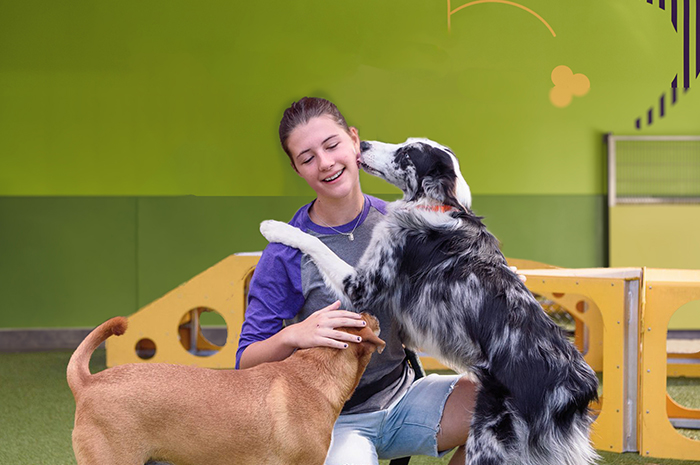
Trained Supervision: Caregivers are trained to understand dog behavior and know how to prevent problems before they arise, whether that’s managing group dynamics during play or spotting early signs of stress or illness. Many staff members also receive training in basic first aid and emergency protocols, so you can trust that your pet is in knowledgeable, capable hands.
Safe & Clean Environment: Professional boarding facilities are built with pet safety in mind. You’ll find features like double-door entries to prevent escapes, secure fencing, well-ventilated indoor spaces, and air filtration systems that help reduce the spread of airborne germs. Rigorous cleaning and sanitation practices keep the environment healthy and comfortable for all guests.
Exercise & Enrichment: A well-structured boarding stay includes plenty of physical activity and mental stimulation. Group play sessions, individual enrichment activities, toys, scent games, and even agility courses help dogs burn off energy and stay happily engaged throughout the day. This helps prevent boredom and promotes a well-balanced boarding experience.
Routine: Dogs thrive on routine. Scheduled mealtimes, potty breaks, exercise, and rest help create a predictable structure that allows dogs to feel safe and secure. For dogs who struggle with changes in environment, a consistent daily rhythm makes the transition to boarding smoother and less stressful.
Socialization: Positive social experiences can support long-term behavioral health and confidence, helping dogs become more adaptable and well-adjusted in new situations. According to a large-scale study of over 13,000 Finnish pet dogs, dogs that had more frequent and varied socialization experiences were significantly less likely to exhibit fear in various social settings. This research highlights how early and ongoing positive interactions can foster resilience and reduce anxiety in unfamiliar environments. For dogs who enjoy the company of others, boarding offers valuable opportunities to interact with both dogs and people in a controlled, supervised setting.
Peace of Mind for You: Perhaps one of the greatest benefits of boarding is the peace of mind it provides pet parents. Knowing that your dog is safe, happy, and well cared for allows you to relax while you’re away. Many facilities provide regular updates, photos, or webcam access, so you can stay connected to your pet and see how they’re enjoying their own little vacation. At the end of the day, a great boarding facility offers more than just a place for your dog to stay; it provides an enriching, supportive environment where your pup can thrive while you’re away!
How Much Does Dog Boarding Cost?
Dog boarding costs can vary depending on the type of facility, services offered, and your location. At a typical dog boarding facility, you can expect to spend between $31-$93+ per night.
Additional services such as grooming, training, or enrichment activities, may come with added fees. It’s always a good idea to ask for a full breakdown of costs when touring a facility or booking a stay, so you know exactly what’s included and what’s optional. Remember that while price is important, it’s equally crucial to choose a boarding option that prioritizes your pet’s safety, comfort, and well-being.
How Does Dog Boarding Work?
Start by calling or booking online with your desired boarding facility to learn about availability, requirements, and next steps. Booking your dog into a boarding facility usually follows these steps. Each phase is designed to ensure a smooth transition for both you and your dog:
Tour & Evaluation: A reputable facility will be happy to offer a tour to show off their accommodations, play areas, and happy guests. While there, make note of the signs of cleanliness you can see and smell.
Booking & Prep: You'll provide vaccination records, feeding instructions, emergency contacts, and pack essentials (food, medications, favorite items). It's important to inform staff of any special needs your pet may have, such as allergies, mobility issues, or ability to climb fences.
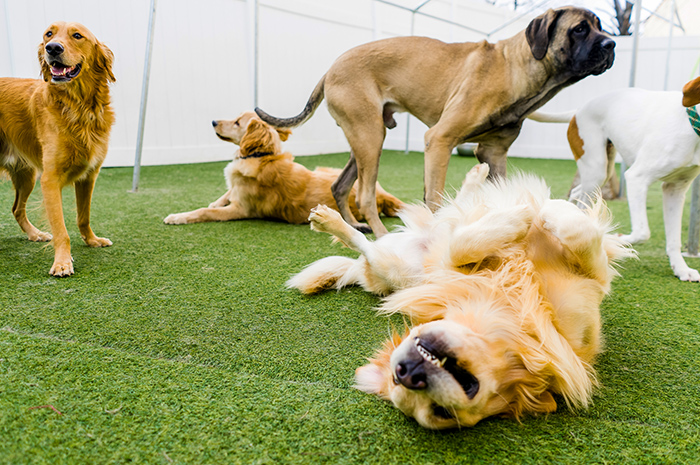
Drop-Off Day: Arrive at your scheduled time and let the staff handle the transition. Dogs pick up on your energy, staying calm helps them adjust more easily.
During the Stay: Dogs follow a routine that includes mealtimes, potty breaks, exercise, rest, and enrichment activities. Staff will monitor health and behavior daily.
Updates: Many facilities provide daily report cards and photo updates so you can keep tabs on your pup.
Pick-Up: Be sure to review business hours and pickup time options. Late pickups may incur extra daycare charges.
Keep in mind that each dog boarding facility is unique, so be sure to review their booking process.
Dog Boarding Risks
While most boarding stays go smoothly, it's important to be aware of potential challenges:
Illness: Exposure to canine cough, canine flu, or parasites is possible. Reputable facilities reduce risk by requiring up-to-date vaccinations and maintaining strict hygiene.
Stress: A new environment, unfamiliar people, or disruption in routine can lead to temporary anxiety or digestive issues.
Injuries: Dogs playing in groups can have occasional scuffles, though proper supervision and group pairing reduce incidents. Ask if your facility has a relationship with a local vet for emergency situations.
Reputable pet boarding facilities will take extensive measures to minimize the risk of illness, injury, and stress through thoughtful facility design, staff training, rigorous sanitation standards, behavior evaluations, safety protocols, and vaccine requirements. Pet parents also play a vital role in keeping their own pets and all pets in the resort’s care, safe and healthy by providing accurate health and behavior histories, maintaining up-to-date vaccinations and parasite control, keeping ill pets at home, and informing staff of any special care needs.
Types of Dog Boarding Services
Not every dog thrives in the same environment. Understanding the boarding options available helps you find the right match for your dog’s needs and your budget.
Traditional Kennels
Budget-friendly
Dogs stay in individual runs or crates with staff checking in regularly
A quieter, more structured environment that’s good for dogs that prefer space or are less social
Daycare + Boarding
Combines active play during the day with overnight accommodations, be sure to checkout our guide on dog daycare to learn everything you need to know
Supervised group play is included
Great for dogs that enjoy socializing and high activity
Luxury Pet Hotels
Upscale boarding that could include plush bedding, TVs, one-on-one attention, and or spa services
May offer webcams for you to check in on your pet remotely
Ideal for pampered pups and pet parents who want peace of mind while traveling
Veterinary Boarding
Supervised by trained medical staff, often within or adjacent to a veterinary clinic
Best for pets with chronic conditions, medications, or recovery needs
May be more clinical, with fewer play and enrichment opportunities
In-Home Care & Pet Sitters
Dogs stay either in a sitter’s home or are cared for in your own home
Can offer a quieter, potentially more familiar environment for dogs who may be uncomfortable in group settings
May lack the structured routine, enrichment activities, and supervision offered by professional boarding facilities
Best suited for independent dogs or those with special behavioral needs, but not ideal for dogs that benefit from stimulation and social interaction
Pet parents should thoroughly vet any in-home care providers before booking
How to Choose the Right Facility
Take time to research and tour your boarding options. A quality facility will welcome your questions and provide clear information on their practices. Ask questions like:
Is the facility licensed and insured?
Do you require proof of vaccination for all dogs?
What is your staff-to-dog ratio?
How are dogs grouped or separated (by size, temperament, age)?
Are staff trained in dog behavior and emergency care?
What’s the daily routine like?
Can I bring my dog’s own food, medications, and comfort items?
How are emergencies handled? How will you contact me?
Do you offer free trial days or tours in advance?
Do you offer additional add-on services that I can purchase for my dog such as dog grooming? (Be sure to check out our guide on dog grooming to learn how to get the best results for your pup!)
Trust your instincts, a clean, calm environment with friendly, attentive staff is always a good sign. Taking a tour of the facility before dropping off your dog is ideal for making sure they are in good hands!
Preparing Your Dog for Boarding
A little preparation can go a long way toward ensuring a smooth boarding experience. Start early and introduce your dog to new experiences gradually.
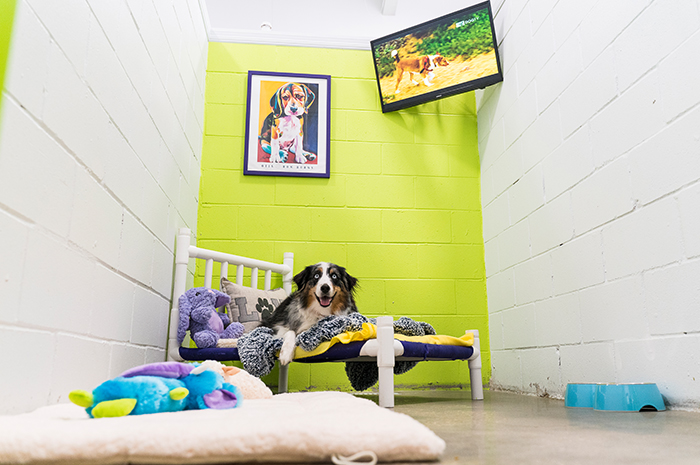
Bring familiar items like blankets, toys, or your dog’s usual bed to help ease anxiety.
Provide detailed instructions on feeding, medication, and behavior quirks.
Schedule a short trial day before a longer stay to help your dog adjust.
Practice calm drop-offs, drawn-out goodbyes can increase anxiety.
Keep your dog’s vaccinations and flea/tick prevention up to date.
Try to avoid bringing brand new foods, treats, or medications that you are not sure how your pet will respond to. Sometimes pet parents show up with all these new things out of guilt and do more harm than good.
Some dogs take to boarding right away, while others need more time. Be patient and check in with staff about how your dog is settling in.
A Day in the Life at a Boarding Facility
Most boarding facilities operate on a structured daily schedule that keeps dogs active, happy, and well-adjusted. A consistent routine can help reduce anxiety and can help dogs settle in. A typical daily schedule at a dog boarding facility might include:
Morning: Wake-up, potty break, breakfast
Late Morning: Group play, outdoor time, or enrichment
Afternoon: Nap time or quiet time in a crate or private suite
Evening: Dinner, another round of play or one-on-one interaction
Night: Wind-down, last potty break, and bedtime in a safe, secure space
Enrichment activities may include agility games, scent work, puzzle feeders, basic training reinforcement, or simple cuddle sessions with staff.
Dog Boarding FAQs
How old does my dog need to be for boarding?
Most facilities require dogs to be at least 4–6 months old and fully vaccinated.
Can I bring my dog’s own food and medications?
Yes. Bringing your own food and meds can help maintain consistency and avoid digestive upset.
What if my dog doesn’t get along with other dogs?
Many facilities offer private suites and individual play sessions for dogs who prefer a quieter experience.
What if my dog has special medical needs?
Let the staff know in advance. Many facilities can accommodate special diets, medication schedules, and medical monitoring with proper instructions.
Final Thoughts
Dog boarding can be a positive, enriching experience for your pup and a stress-free solution for you. The right facility does more than meet your pet’s basic needs—it provides structured routines, expert care, and opportunities for fun and engagement while you’re away.
While in-home care can work well for certain situations, professional boarding offers an added layer of consistency, oversight, and safety that many pet parents value, especially for active dogs or those who benefit from socialization and enrichment.
The key is finding a facility that fits your dog’s personality, preferences, and care needs. Take the time to visit, ask questions, and get a feel for the environment. With the right preparation and the right boarding partner, you can travel with confidence knowing your dog is happy, well cared for, and maybe even having a vacation of their own.
Want to learn more or see a facility in person? Explore dog boarding facilities around the country.
Why Pet Parents Trust PetSuites for Dog Boarding
With over 90 locations nationwide and more than 20 years of experience, PetSuites has built a reputation for providing exceptional care in safe, fun, and engaging environments. From spacious indoor and outdoor play yards to in-ground pools and custom play structures, our resorts are thoughtfully designed to support every pet’s physical and emotional well-being.
Ready to try boarding your dog? Get your dog’s First Stay & Play - FREE! Stay one night and play the next day at our fun, safe, and caring pet resort.
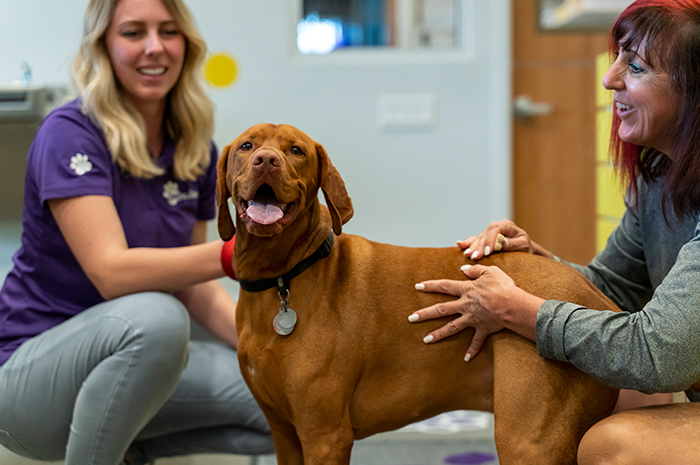
Our information is developed in close collaboration with our expert team of dog caregivers, trainers, and groomers - people who live and breathe pet care every day. Whether you’re exploring boarding options for the first time or you're a seasoned traveler looking for a trusted partner, you can count on PetSuites to deliver expert insight and loving care tailored to your pet’s unique needs. At PetSuites, this isn’t just what we do; it’s who we are. Because your pet deserves a stay that’s safe, happy, and full of tail wags!
